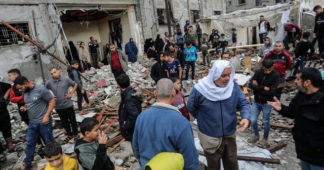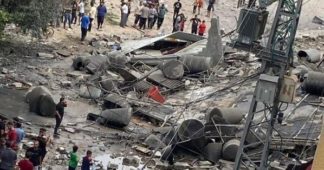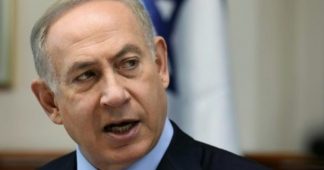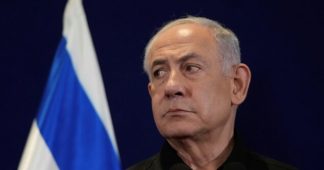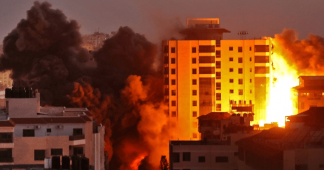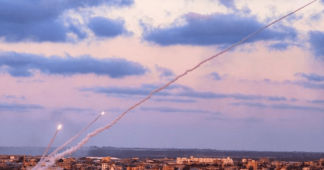By Jessica Buxbaum*
30 November, 2023
The Hamas attacks of 7 October have consumed Israeli society with grief and anger. Yet amid the shock, some, especially in government, have taken advantage of the situation to spread anti-Palestinian vitriol that analysts say carries dangerous results.
“We are fighting human animals, and we are acting accordingly,” Israel’s Defence Minister, Yoav Gallant, said, describing the Israeli military’s response just days after Hamas’ attack. “We will eliminate everything – they will regret it,” Gallant added.
Israel’s Prime Minister Benjamin Netanyahu, meanwhile, evoked a biblical analogy referring to the Israelites’ enemy, largely interpreted as a genocidal call to wipe out Gaza.
“You must remember what Amalek has done to you, says our Holy Bible – we do remember,” he said during an official video statement.
“There will be no electricity and no water (in Gaza), there will only be destruction. You wanted hell, you will get hell,” Maj. Gen. Ghassan Alian, who heads the Israeli army’s Coordination of Government Activities in the Palestinian Territories (COGAT), declared.
Moshe Feiglin, the founder of Israel’s right-wing Zehut Party and former Likud representative in Israel’s parliament, has also called for the complete destruction of Gaza.
“There is one and only (one) solution, which is to completely destroy Gaza before invading it. I mean destruction like what happened in Dresden and Hiroshima, without nuclear weapons,” he said.
In another statement, Feiglin said Israel’s end goal should not be to eliminate Hamas, but rather, “Gaza should be razed and Israel’s rule should be restored to the place. This is our country”.
Amit Halevi, meanwhile, a Likud member in parliament, said, “There should be two goals for this victory: One, there is no more Muslim land in the land of Israel … After we make it the land of Israel, Gaza should be left as a monument, like Sodom”.
Some Israeli politicians have outright called for a repeat of the Nakba, or catastrophe in Arabic, when hundreds of thousands of Palestinians were expelled and hundreds of villages demolished from 1947 to 1948 as the state of Israel was being established.
“Nakba? Expel them all,” Nissim Vaturi, deputy speaker for Israel’s parliament, said. “If the Egyptians care so much for them – they are welcome to have them wrapped in cellophane tied with a green ribbon.”
Ariel Kallner, a member of Israel’s parliament, said, “Nakba to the enemy now! This day is our Pearl Harbour. We will still learn the lessons. Right now, one goal: Nakba! A Nakba that will overshadow the Nakba of 48. A Nakba in Gaza and a Nakba for anyone who dares to join!”
Yinon Magal, a journalist and politician, said, “It is time for Nakba 2.” In another post on the social media platform, X, Magal captioned a picture of a carpet-bombed neighbourhood, “This is how all of Gaza should look”.
Israeli Heritage Minister Amichai Eliyahu said in a radio interview that dropping an atomic bomb on Gaza was a possible tactic Israel could employ.
“Your expectation is that tomorrow morning we’d drop what amounts to some kind of a nuclear bomb on all of Gaza, flattening them, eliminating everybody there,” the interviewer said.
“That’s one way,” Eliyahu responded. He then walked back his comments, saying on X that using an atomic bomb was merely “metaphorical”.
This inflammatory rhetoric has been replicated online. An investigation from Palestinian digital rights organization, 7amleh, found that the social media behemoth, Facebook, approved adverts calling to “wipe out Gaza, its women, children, and elderly” as well as to kill Palestinians, burn down Gaza, deport Palestinians to other countries, and carry out a second Nakba.
Experts in conversation with The New Arab have noted that genocidal rhetoric has been a constant throughout Israel’s occupation of Palestine.
Palestinian journalist Ramzy Baroud said Israel – as a settler-colonial society – is continuously expanding its territory and using genocidal language to justify its colonisation.
“For territorial expansion to happen, the natives of the land must be dehumanised completely, or their very existence denied,” Baroud said.
In 1969, former Israeli Prime Minister Golda Meir stated, “There was no such thing as Palestinians”. This year, in March, far-right Finance Minister Bezalel Smotrich repeated the same claim, saying there’s “no such thing as the Palestinian people”.
While genocidal rhetoric has persisted throughout the state’s existence, Israeli human rights lawyer Michael Sfard explained it has now become normalised in Israel during this war because Israeli celebrities, leaders, and journalists are the ones espousing such language.
“When it comes from people that are famous or known, that provides a tailwind for many others to think that this is an okay type of speech,” Sfard told The New Arab.
“In the past, it was seen inside Israel as something that was beyond the borders of legitimacy to talk that way about Palestinians,” Sfard said. “But October 7th broke that red line.”
Amid the countless Israeli statements promoting expulsion and genocide, condemnation from Western nations against such speech is rarely found. Baroud believes this is because Western leaders are complicit.
“The West doesn’t condemn it because the West is financing it,” Baroud said. Since the war began, the United States, United Kingdom, and European countries have sent large sums of arms, equipment, and troops to the region.
Analysts have long argued that dehumanising and genocidal statements inflame tensions and provoke violence, but for Baroud, as a Palestinian, the result could have an even more devastating effect on the prospect of peace.
“When you start mainstreaming this language,” Baroud said. “It’s hard to imagine the outcome in Israel is going to be a society in which Palestinians can coexist.”
* Jessica Buxbaum is a Jerusalem-based journalist covering Palestine and Israel. Her work has been featured in Middle East Eye, The National, and Gulf News.
We remind our readers that publication of articles on our site does not mean that we agree with what is written. Our policy is to publish anything which we consider of interest, so as to assist our readers in forming their opinions. Sometimes we even publish articles with which we totally disagree, since we believe it is important for our readers to be informed on as wide a spectrum of views as possible.
